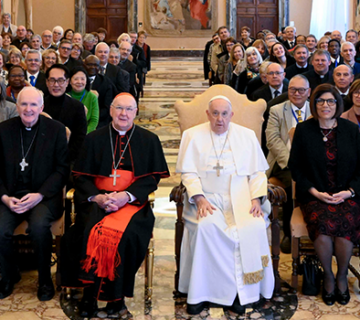 “We prepared ourselves for marriage certain that we would commit ourselves for the rest of our life. But already after the birth of our daughter, he started to go out alone and I, who was always exhausted due to work and maternity, aside from still being in love with him, I did not realize at once that something was wrong. What followed were 13 years of lies and quarrels, alternating with false clarifications which were followed by continuous delusions. I was exhausted and on the verge of a nervous breakdown (my weight dropped to 36 kilos) and so finally I surrendered, and gave my husband his freedom.
“We prepared ourselves for marriage certain that we would commit ourselves for the rest of our life. But already after the birth of our daughter, he started to go out alone and I, who was always exhausted due to work and maternity, aside from still being in love with him, I did not realize at once that something was wrong. What followed were 13 years of lies and quarrels, alternating with false clarifications which were followed by continuous delusions. I was exhausted and on the verge of a nervous breakdown (my weight dropped to 36 kilos) and so finally I surrendered, and gave my husband his freedom.
After three years I met one of my former classmates, he too was a father and separated from his wife. Initially I tried to resist the sentiments that I felt were growing within me because, if on one hand the fact of feeling myself loved gave me much joy, on the other hand I had to face the problem of my Christian faith. They were very difficult moments. But then the doubts disappeared because, I told myself, it is true that when I got married I thought that it would be ‘forever’ but if love is no longer reciprocated, why can’t I continue with another person in that vocation of family life which I have always felt as mine?
Certain of our love for one another we decided to join our two broken lives. After around two years of living together, we had a son, whom we had baptized and who we try to educate in a Christian way.
For my partner – a person who is very honest and upright who considers himself as a non-believer – the problem of belonging to the Church does not exist. I, instead, continued to go to Sunday Mass and, even in suffering, I accepted the standpoint of the Church by abstaining from receiving the sacraments of Reconciliation and the Eucharist. I could have gone to a church were no one knew me, but out of obedience I didn’t do it.
But after awhile, this self-exclusion began to weigh on me and so I stopped going to Mass and participating in the life of the community. In fact, I felt a strong discomfort in seeing the others going to the altar while I had to remain in my seat. I felt abandoned, rejected, guilty.
After a few years, thanks to my closeness to the Focolare I started once again my journey of faith. ‘God loves you immensely’, they repeated to me. Together with them I understood that Jesus died for me too, and that He, in his infinite love, had already filled up that abyss into which I had fallen and all that he was waiting for was for me to follow Him for the rest of my life.
And so I discovered that, aside from the Eucharist, there were other sources through which I could meet Jesus. He hides himself in every neighbour of mine, he speaks to me through His Gospel and is present in the community united in His name. Above all, I can find Him whenever I am able to transform the suffering of not being able to approach the Eucharist, into love.
I remember when our son made his first Holy Communion. I was the only parent who did not go to the altar with him: it was a suffering that I cannot even describe. In exchange I can say that it was precisely when I lost the Eucharist that I discovered the great gift that it is, just like how you discover the value of good health when you lose it.
On the day that I will present myself to the Father I hope that He will look not at my failures but rather at all my small efforts to love the others as Jesus had taught us.”


 Italiano
Italiano Español
Español Français
Français Português
Português



Bellissima testimonianza, veramente toccante ed edificante. Da molta gioie e speranza sapere che papa Francesco insieme ai vescovi del Sinodo sulla famiglia stanno adoperandosi per “rimediare” a certe situazioni dolorose . Sara; una ulteriore dimostrazione della maternità della Chiesa , dispensatrice di amore e misericordia piuttosto che severa nutrice che si assicura che siano rispettate regole ! Preghiamo che sia cosi
Non riesco a capire qualcosa…il divorziato non può prender la comunione, il pedofilo, il ladro, l’assassino eccc. ecc. se la cava con qualche penitenza.Mi sembra che in questa etica sociale della Chiesa qualcosa mi sfugge!
Si chiama ‘peccato mortale’, cioè peccato grave (contro i 10 comandamenti) fatto con consapevolezza: chi in questo stato si comunica commette un sacrilegio e un ulteriore grave peccato. L’unica via è il pentimento e la confessione: cancellato il peccato mortale si torna in grazia di Dio. Per fare una confessione valida è fondamentale e NECESSARIO il pentimento. Chi è nella condizione di divorziato risposato ed è realmente pentito fa come dice Gesù (e S.Paolo): vive casto come fratello-sorella
Questo commento all’esperienza di Tiziana non fa una piega. Se si trattasse però di una situazione teorica. Ma qui siamo di fronte ad una persona concreta, che in un cammino faticoso e difficile ha fatto delle scelte, discutibili sotto il profilo etico, che ora vincolano la sua vita e quella di altre persone. Una di queste è il figlio, che ha il diritto di crescere accompagnato dai quei due genitori che l’hanno chiamato alla vita. Un diritto che per essi diventa un dovere etico.
Pentirsi non vuol dire trascurare i diritti altrui, né mancare ai propri doveri. Tiziana, secondo le indicazioni della Chiesa, non si comunica. E fa bene. Come ha ritenuto di far bene a continuare la convivenza con il nuovo partner per il bene del figlio minorenne. Vivere allora da fratello e sorella? Conosco coppie che per accostarsi alla comunione e sentirsi così in pace con Dio, lo fanno (o cercano di farlo). Ma l’esperienza di qualcuno non può essere l’esperienza di altri.
L’importante per noi è annunciare a tutti che Dio ci ama immensamente. Sarà Lui poi a manifestarsi loro, nei modi che Lui stesso riterrà. Sappiamo che tanti risposati si accostano alla comunione col beneplacito dei loro sacerdoti. Fra l’altro il concedere la comunione ai risposati è un’ipotesi avanzata anche da alcuni cardinali nella recente sede sinodale. Tiziana non lo fa: è il suo modo per vivere il “chi ascolta voi ascolta me”. Il giudizio non compete a noi, ma solo a Dio.
Grazie delle risposte. Non era mia intenzione giudicare Tiziana. Volevo solo chiarire una cosa: l’obiettivo del cristiano è dar gloria a Dio amandolo con ogni sforzo sopra ogni creatura, sopportando e soffrendo tutte le ‘croci’ per Lui, puntando quindi al massimo, alla santità, non al minimo del peccare poco quanto basta per salvarsi. Dunque un santo che per sfortuna (e colpa) si ritrovasse ad essere divorziato risposato, lascerebbe qualsiasi cosa per Gesù:….
….lasciare dei piaceri carnali per Dio (nell’eucaristia) significa lasciare il nulla per il Tutto. La Chiesa mostra sempre la via della santità, senza false scorciatoie illusorie: questa via è il Calvario per chi ha un pensiero mondano e un paradiso anticipato per il cristiano che rinnega se stesso e ama Dio e il prossimo con tutta l’anima. La santità è per TUTTI, tutti siamo chiamati ad essa e per tutti è accessibile.
Quel qualcosa sfugge a molti di noi. Attendiamo il mese di Ottobre le decisioni del Sinodo.
Nel frattemmpo teniamo bene in mente e nel cuore le parole di Papa Francesco ai giornalisti che gli chiedevano un parere sugli omosessuali: ” CHI SONO IO PER GIIDICARE?” Un mio parere da credente impegnato: la carità, l’amore è superiore a qualsiasi legge: sulla carirtà saremo giudicati. .. da Dio paziente e misericordioso.
Grazie Tiziana della tua bellissima esperienza!